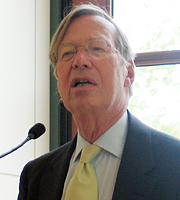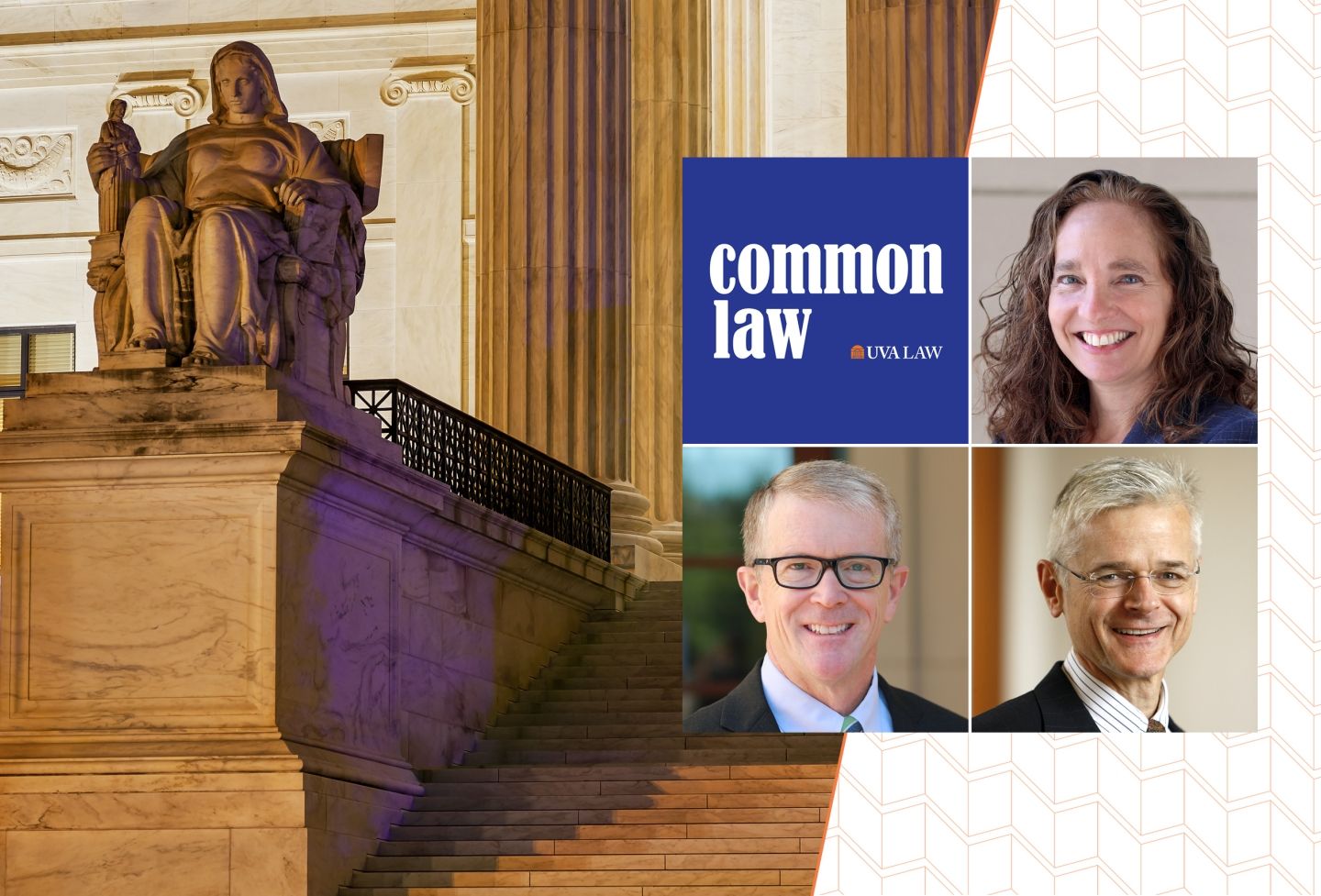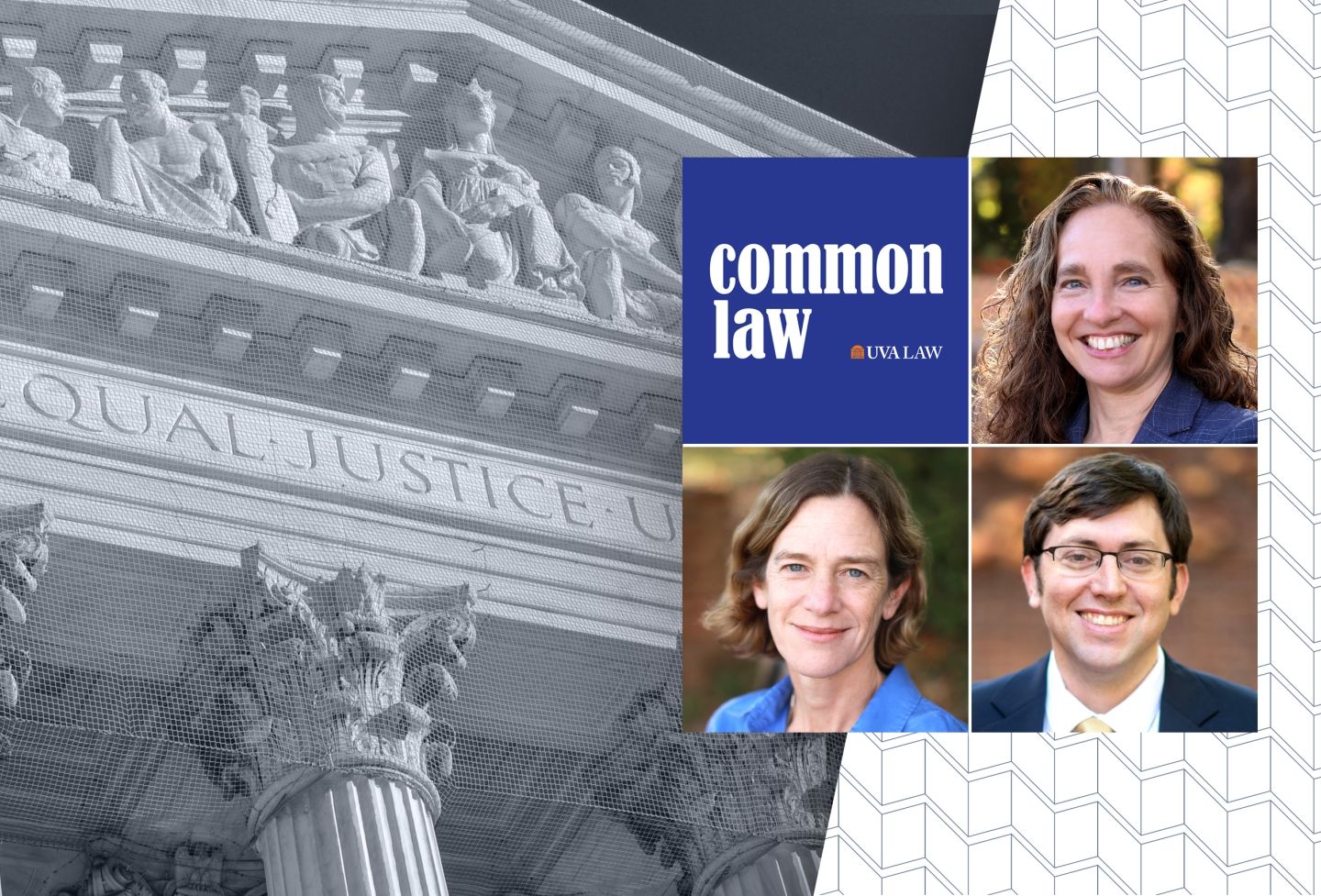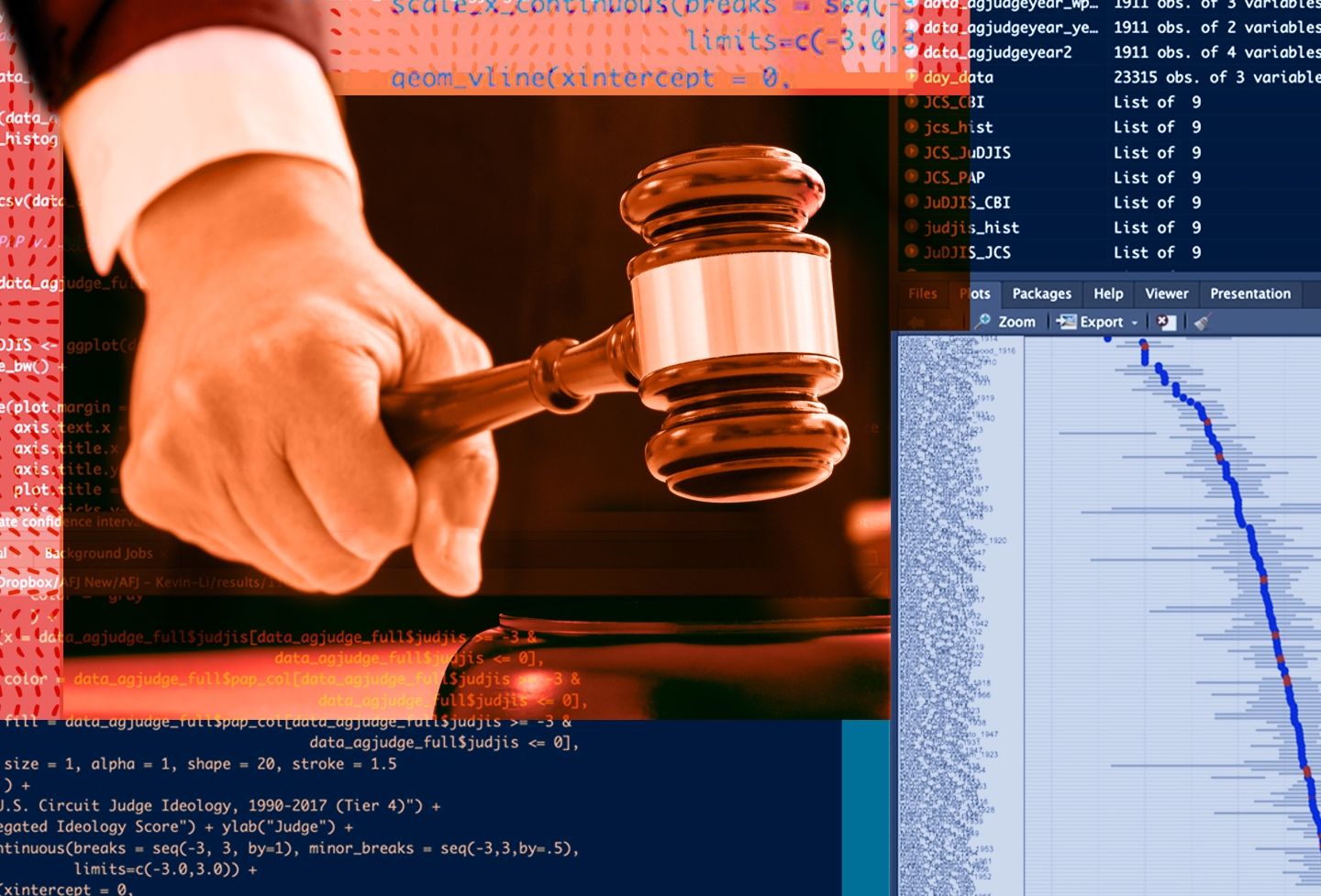Dworkin Explores Secular, Religious Models for Society

Americans should turn to universal principles, such as the concept of personal responsibility, to decide whether their society should follow a tolerant religious model or a tolerant secular model, said Jefferson Medal in Law recipient Ronald Dworkin at a lecture April 12.
Dean John Jeffries introduced Dworkin, a New York University law professor, as a defender of liberalism and “one of the perhaps two leading legal thinkers of our time and one of America’s great public philosophers.” Jeffries also explained that the Jefferson Foundation Medal in Law has been awarded annually since 1977 as an alternative to honorary degrees, which some believe Thomas Jefferson specifically forbade.
“I’m going to talk about the subject dearest, I believe, to Mr. Jefferson’s heart, which is liberty and in particular liberty and religion,” Dworkin began.
Strong American religiosity, in contrast to European countries and other democracies, is nothing new, Dworkin said.
“What’s new in our politics now is not, I think, the religiosity as a phenomenon but the power, militancy, and apparent success of evangelical religious movements in our politics,” he said.
Some analysts attribute President Bush’s 2004 victory to voters’ emphasis on moral values, and American political leaders “seem to be rushing to church in very great numbers.” Still, the recent enthusiasm for bringing religion into political life is opposed by others, including some religious leaders.
“There is a great deal of controversy and some bitterness about the question… of what role religion should play in our public life,” Dworkin said. “What there is not much of is argument—I mean genuine argument in which people attempt to find principles that can be very widely shared and then to argue their position from principles that it would be reasonable for them to expect those to whom they talk also to accept.”
Constructing “an argument of that character” is Dworkin’s goal, he said. One way to proceed might be to address specific controversial issues such as abortion, stem cell research, gay marriage, education vouchers, and countless others, but because the cutting-edge issues are continually changing, Dworkin proposed a different strategy.
“I’m going to distinguish two rather abstract models of how we should think about the relation of church and state in the American polity, and I’m going to attempt to argue in favor of one of these models and against the other, but drawing from principles that I hope we all can accept or almost all can accept,” he explained.
Both models, the tolerant religious model and the tolerant secular model, incorporate religious tolerance, but they differ in from where this tolerance should come.
“The tolerant religious model supposes that the United States should be as a nation committed to religion… as a personal and public value, except that that commitment should never justify imposing religion or any particular faith on anyone,” he said. “The tolerant secular model supposes… that as a nation, we should not be committed to any view about the value, importance, truth of religion even in an abstract way as in a commitment to monotheistic religion.”
According to the tolerant secular view, the nation’s political life should be indifferent toward religion but remain “in a spirit of tolerance.”
“Which should we be? A religious nation that tolerates dissent, a secular nation that tolerates religion?” he asked.
Dworkin acknowledged that in practice the nation combines these models but criticized this compromise as “incoherent.”
“When we discuss this issue, attempting to do so in the spirit not of practical politics but of principle, we have to accept that these state two very different principles of political organization and that in the end we have to choose between them—not that we will choose between them, but to the degree that we don’t, we’re not behaving in a principled way,” he explained.
In choosing between the models, some might decide to employ the strategy that has marked mainstream liberal political philosophy since John Rawls, Dworkin said. Under the philosophy of political liberalism, people are expected to isolate their religious views from their political beliefs and behavior. Although Dworkin recognized this approach as “attractive,” he said he found it both “unrealistic” and somewhat illegitimate.
“We can’t ask people to set aside their most profound convictions about the truth of deep moral and ethical issues when we are also asking them to make decisions… that are for most people the most basic and fundamental moral and ethical decisions they will in their lifetime be called upon to make,” he said.
Instead, Dworkin suggested it is necessary to find “very basic philosophical principles” that unite us and then to “excavate” them and apply them to this controversy.
Returning to the abstract models, he said they differ in their interpretations of the two parts of the First Amendment pertaining to religion: the prohibition of the establishment of religion and the prohibition of infringement of the free exercise of religion.
The tolerant religious model interprets the prohibition of establishment as a ban on establishing a particular denomination, not a ban on state endorsement of a broader religious principle such as monotheism.
“So a tolerant religious model would encourage our leaders to appeal to God as President Bush does,” Dworkin said. “Bush defends his policies abroad by saying that in pursuing liberty he is bowing to the will of the author of liberty. He doesn’t mean John Stuart Mill.”
In contrast, the secular model interprets it as a “ban on endorsement of religion, no matter how abstractly defined.”
The First Amendment prohibition on the infringement of the free exercise of religion also draws a distinction between the models’ conceptions “about the foundation of the right of religious freedom.” According to the tolerant religious model, “religion is something… of capital importance in itself,” so it follows that Americans can have the right of religious freedom without recognizing any broader right of freedom, such as the right to abortion or gay marriage.
But the tolerant secular model “cannot distinguish a right to religious freedom from a more general right to freedom by saying that religion is of particular importance because the ontological force of the secular model is to dispute exactly that.” Instead, the right to religion is from a “more abstract and general right,” such as freedom of conscience.
“Once [the tolerant secular model] has recognized a general right from which the specific right to religious freedom is drawn, then it needs to take on a substantive argument as to how far that more general right extends, and that’s the question that I think we must now focus on,” Dworkin continued.
This requires finding a principle that allows us to center on the issue, and Dworkin suggested it should be: “Each of us has, every human being every place has, a personal inalienable responsibility to decide for ourselves what success in living consists in, what would be a good or appropriate life for us.”
This right is not recognized everywhere and does not mean individuals are immune from the impact of the culture in which they live. For example, in this country culture pressures people to prioritize material wealth as an “indispensable ingredient” of living a successful life. Significantly, though, Americans are immune from “ethical subordination,” meaning “the deliberate coercive imposition” of a particular idea about what a successful or good life entails.
“That means that we must together construct an American conception of liberty which honors that personal responsibility,” he said.
“Liberty” is distinct from “freedom” in this context. “Government comprises or infringes your freedom whenever it prevents you from doing something that you want to do or indeed might want to do.” In this sense, it is descriptive, rather than political, he said.
In contrast, “Liberty is the power to do what the government has no right to stop us from doing,” he said. “And what the government has a right to stop us from doing in part depends on how we understand the personal responsibility I just described.”
Dworkin suggested that “liberty is not constrained when the government has an adequate distributive reason for limiting freedom.” This is distinct from the “personally judgmental justification” in which the government assumes the paternalistic attitude of knowing what is best for citizens to justify placing constraints on their freedom.
“Now the principle of personal responsibility that I described is one that condemns personally judgmental justifications for constraining freedom,” he said.
This does not, however, automatically imply that the tolerant religious model is unacceptable under personal responsibility because the model relies on something more “robust” than paternalism: “the claimed right of a majority to create the kind of environment it wishes, not for the sake of those who resist it, but because they want to live and bring their children up in a culture that is congenial.”
Dworkin said he believes this claimed right is the strongest argument in favor of the tolerant religious model and brings up the issue of “how a culture is properly formed.” The many kinds of culture—which include economic, moral, ethical and aesthetic—are created in two main ways. The first is “organically as a vector of individual decisions,” and the second is “a collective imposition on the culture.” While conservative tradition in this country generally emphasizes the organic method in the economic culture, its proponents prefer the collective approach for the ethical culture.
“If our personal responsibility means anything, then it requires us to adopt a theory of liberty such that our ethical culture is formed organically as a vector of individual free decisions,” Dworkin asserted. “Why do I emphasize that distinctly for the ethical culture? Because that’s what personal responsibility is about.”
Based on prominent religious and philosophical traditions in the United States, individuals have a responsibility to decide for themselves what counts as value in their lives.
“It isn’t a liberty against paternalism that requires us to accept the tolerant secular model for our society,” Dworkin continued. “It’s a concern for our personal responsibility, for the dignity and the self respect that that responsibility flows from and solidifies that we have to think about when we choose between these two models.”
Dworkin concluded that the tolerant secular model is preferable, although he invited people to use the concept of personal responsibility to argue in favor of the tolerant religious model.
Founded in 1819, the University of Virginia School of Law is the second-oldest continuously operating law school in the nation. Consistently ranked among the top law schools, Virginia is a world-renowned training ground for distinguished lawyers and public servants, instilling in them a commitment to leadership, integrity and community service.


